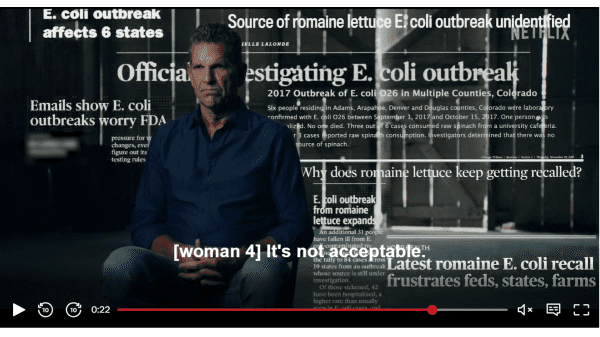I’ve watched the new Netflix documentary, Poisoned: The Dirty Truth about Your Food. Netflix said that this film was the fourth most viewed nationwide as of August 3.
The film breaks down into five segments, covering the Jack-in-the-Box E. coli outbreak of 1992-93; the flagrant safety violations of the Peanut Corporation of America under owner Stewart Parnell, which won him 336 months in prison; the crimes of egg tycoon Jack DeCoster; and Salmonella in the fresh chicken industry, present-time (the film producers tested 150 chicken samples from supermarkets; 17 percent were contaminated with salmonella).


I will focus on the segment on the leafy greens industry. It doesn’t come off well, although in the end the chicken industry, notable Perdue, probably took the biggest hits.
The segment focused on the continued problem of E. coli in leafy greens, starting with the 2006 outbreak in baby spinach. Timothy Lytton, food safety expert and author of the important book Outbreak, observed, “The industry was terrorized. They realize that if they didn’t get to the bottom of this problem, it would essentially destroy the California leafy greens industry.”
The film did point out that the industry implemented the California Leafy Greens Marketing Agreement (LGMA) BB #:210653 in the wake after the spinach outbreak.
But Bill Marler, the leading food safety litigator in the U.S., said that the LGMA “was a way to make sure that the government doesn’t enforce rules on them that they don’t really like.”
Marler contended, “They just don’t want to come to grips with the fact that the big problem is cattle farms and feedlots in close proximity to where you’re growing leafy greens,” alluding to the fact that the largest leafy greens operations in Salinas, CA, and the Yuma Valley in Arizona, are close to major livestock operations, whose feces are a source of E. coli infections.
“Growers don’t control practices of cattlemen; cattlemen feel that they’re not responsible for produce safety,” commented Mike Taylor, who was deputy commissioner for foods in the Obama administration’s FDA.
In 2014–2021—post-LGMA—78 foodborne disease outbreaks linked to leafy greens (mainly lettuce) were reported to CDC.
Nevertheless, Tim York, CEO of the LGMA, said, “I am confident of the progress we have made with the LGMA and the difference we have made in the industry.”
Probably the most damning part of the film, from the produce industry’s point of view, came at the end, when interviewees were asked what foods they would avoid.
Darin Detwiler, who took more than a casual interest in the subject after losing his baby son to the Jack-in-the Box outbreak and became a professor of food safety, gave this list:
1. Cantaloupes; since you have to cut through the rind to get through to the fruit, you contaminate it. “There’s no kill step,” he comments. (For safety recommendations, see this link.)
2. Sprouts, a common cause of food-borne illness when eaten raw, as they usually are.
3. Bagged lettuce, a persistent problem in the leafy greens industry. Marler recommended buying whole-head lettuce and washing it yourself.
It didn’t help that Mindy Brashears, USDA food safety chief under the previous presidential administration, said, “I do steer clear of romaine.”
In short, after viewers had watched an hour and a quarter of film outlining the crimes of DeCoster and Parnell, astonishing levels of Salmonella in raw chicken, and harrowing images of infants dying from E. coli in ground beef, the biggest warnings they got were about fresh produce.
I can’t dismiss this film as yet another hatchet job. The people interviewed were not representatives of ideologically driven “centers” for “public health” and the like. These are the best-informed and most respected authorities in the nation and having had interchanges with some of them (such as Marler and Lytton), I believe that the film represents their views.
In short, the leafy greens industry has not solved the E. coli problem. To do so, it will almost certainly have to confront the cattle industry.



